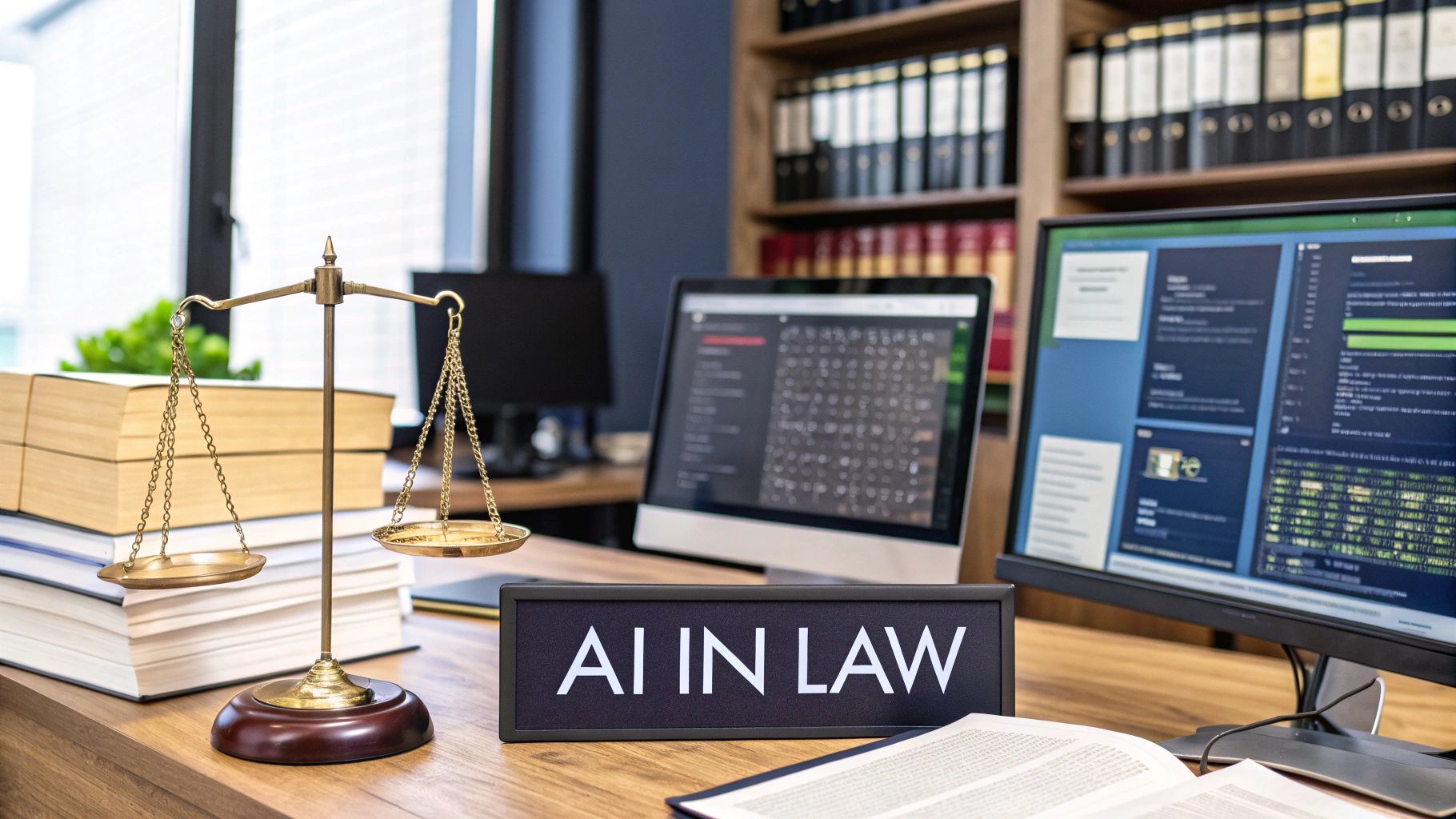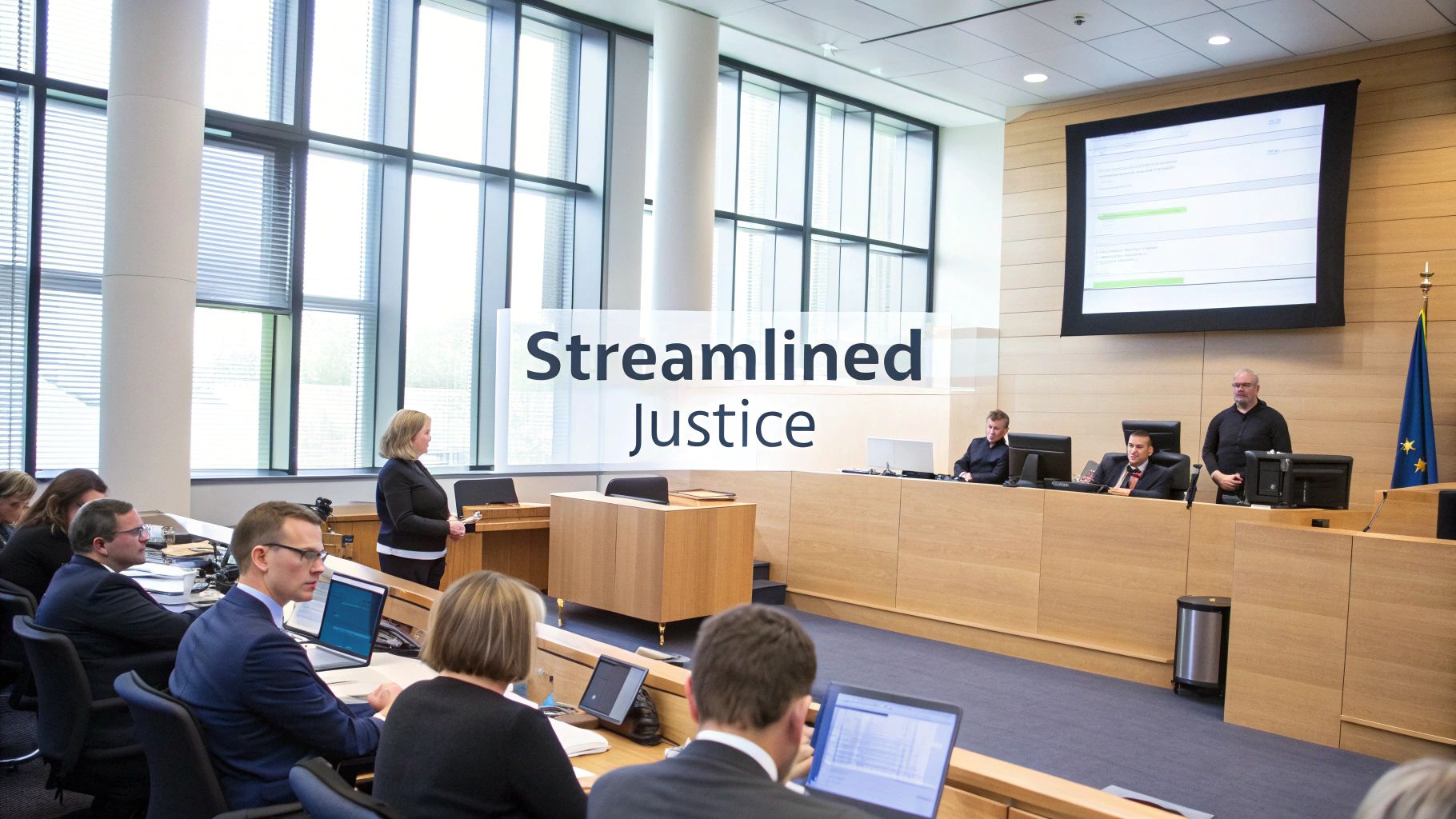The Rise of Artificial Intelligence Lawyers: Hype vs. Reality

Just a few years ago, the concept of "AI lawyers" felt like something out of a science fiction movie. Most attorneys, myself included, would have scoffed at the idea. But today? These tools are an integral part of my daily practice at Cordero Law. The impact of AI is being felt throughout the legal profession, and frankly, it's astonishing.
This isn't just a minor technological upgrade. It represents a fundamental shift in how legal work is done. Factors like client expectations, intense competition between firms, and the pervasive issue of lawyer burnout created an environment ripe for change. The legal field needed a catalyst, and AI has stepped into that role.
From Automation to Actual Legal Reasoning
Early iterations of AI in law were primarily focused on document automation. Think glorified find-and-replace functionality – not exactly groundbreaking stuff. However, current AI systems are evolving rapidly. They can analyze complex legal issues, and some can even draft compelling legal arguments. It's a development that's both impressive and a bit unsettling.
The Uncomfortable Truth About Junior Associates
There's an elephant in the room that few are willing to address: AI is already outperforming junior associates on certain tasks. When it comes to due diligence and contract review, AI is often faster, more cost-effective, and, surprisingly, more accurate than a first-year attorney. The data backs this up. While partners may not be eager to hear it, it's a reality we must confront. A 2025 report by Thomson Reuters revealed that 72% of legal professionals view AI positively, predicting it will free up 4 hours per lawyer each week. That translates to roughly $100,000 in potential billable time. Firms are using this newfound time for everything but document review, focusing instead on client relationships, strategic planning, and other high-value activities. For more detailed statistics, check out this resource: How AI Is Transforming the Legal Profession.
So, Where Does That Leave Us?
The question isn't if AI will reshape the legal landscape, but rather how quickly and how profoundly. It's a prospect that can be both daunting and exhilarating. AI is forcing us to reconsider what it truly means to be a lawyer in the 21st century. It's pushing us – or at least, it's pushing me – to elevate our skills and focus on the uniquely human aspects of legal practice. This includes strategy, client relationships, and creative problem-solving – the areas where AI, at least for now, cannot compete.
Who's Actually Using These Artificial Intelligence Lawyers?

There's a lot of talk about AI in law these days. But there’s a noticeable gap between the hype and who's actually using it. Large firms are investing millions in custom AI solutions. Meanwhile, solo practitioners and small firms are transforming their practices with affordable, readily available AI tools.
The key differentiator isn't firm size, but a willingness to adapt. Even the most tech-resistant lawyers are quickly becoming AI enthusiasts once they see the impact on their billable hours. Let's be honest, improved profits are a powerful motivator.
AI adoption is increasing, albeit unevenly. By the end of 2024, daily use of generative AI (GenAI) became increasingly common in firms globally. Already, 25% of legal professionals worldwide were using these tools weekly. Find more detailed statistics here. The growth rate is staggering, with AI usage by solo practitioners tripling in just one year. It seems everyone suddenly realized AI's real impact.
Where AI Is Making the Biggest Impact (So Far)
Some legal areas are better suited for early AI adoption. Transactional work, contract review, and due diligence – tasks involving large document volumes – are prime examples. AI excels at this type of tedious work, freeing up lawyers for more strategic tasks. No one truly enjoys sifting through hundreds of contract pages, and AI offers a welcome solution.
To understand the varying adoption rates across different legal specialties, let's look at the following table. It provides a snapshot of how AI is currently being implemented and its impact on efficiency.
AI Adoption Across Legal Practice Areas
| Practice Area | Adoption Rate | Primary AI Applications | Typical Time Savings |
|---|---|---|---|
| Contract Review | High (60%) | Document analysis, clause identification, risk assessment | 50-75% |
| Due Diligence | Medium (40%) | Document review, data extraction, anomaly detection | 30-50% |
| Litigation | Medium (35%) | Legal research, eDiscovery, predictive analytics | 20-40% |
| Intellectual Property | Low (20%) | Trademark search, patent analysis | 10-20% |
| Family Law | Low (15%) | Document automation, case management | 5-15% |
As you can see, areas dealing with high volumes of documents, such as contract review and due diligence, are experiencing the highest adoption rates and most significant time savings. While other areas are lagging, the trend suggests that AI will continue to expand its reach within the legal field.
The Awkward Middle Stage of AI Adoption
Many firms are in a strange transitional phase. Some attorneys are fully embracing AI, testing every new tool. Others are resisting change, hoping it's a passing trend. It's not. AI is reshaping the legal landscape, and those who adapt quickest will thrive.
AI Legal Tools That Actually Deliver Results

Let's be honest about the real-world applications of artificial intelligence lawyer tools. What's actually producing tangible results, beyond the polished presentations at tech conferences? I'm talking about practical applications that make a difference.
Contract analysis, for instance, is a true game-changer. I've personally witnessed contract review time decrease by a staggering 80%. Even better, the AI catches those subtle details that human eyes often miss. These are the small, yet critical, points that could end up costing a client a significant amount of money.
Legal research, while promising, still has a long way to go. It absolutely requires human oversight, much more than many vendors would like you to believe. I’ve spent thousands on AI tools that over-promised and under-delivered, so I'm sharing my experiences to save you the trouble. We’re focusing on the practical uses across various legal fields, from litigation and transactional work to compliance and even client intake.
Stuff That Works, Stuff That Doesn’t
Here's the truth you won't hear at legal tech conferences: everyone is figuring this AI thing out through trial and error. We certainly are at Cordero Law.
I’m happy to share what’s working for us. But, just as importantly, I’ll also share our mistakes. Like the time our advanced AI cited a completely fabricated legal precedent during a major case preparation. The partner’s reaction was…memorable, and not in a good way. Sometimes, knowing what doesn't work is more valuable than celebrating the wins.
Most firms are currently navigating this awkward phase of trying to understand the potential of AI in legal practice.
Tools, Tools, and More Tools. Where Do You Even Start?
With so many tools available, it can be overwhelming. They all claim to be "the next big thing." Here's a brief overview of some categories and what you can realistically expect.
To help you navigate the options, I've compiled a comparison table. It summarizes key features of various AI legal tools, including their ideal use cases, typical cost ranges, learning curve, and a reliability score based on my experience.
Artificial Intelligence Lawyer Tools Comparison: Evaluation of leading AI legal tools based on actual performance metrics, cost, and practical implementation challenges.
| Tool Category | Best For | Typical Cost Range | Learning Curve | Reliability Score (Out of 5) |
|---|---|---|---|---|
| Contract Analysis | Transactional work, due diligence | $500-$5,000/month | Easy to Moderate | 4 |
| Legal Research | Litigation, regulatory compliance | $1,000-$10,000/month | Moderate to Difficult | 3 |
| eDiscovery | Litigation, investigations | Varies wildly | Steep | 2.5 |
| Document Automation | All practice areas | $100-$1,000/month | Easy | 4.5 |
| Client Intake & Communication | Small firms, solo practitioners | $50-$500/month | Easy | 3.5 |
As you can see, each tool category offers unique benefits and challenges. Consider your specific needs and budget when selecting the right tool for your practice.
The Future of AI and Law (Seriously, Though)
AI isn't about replacing lawyers, at least not yet. It’s about partnership. It's about human lawyers working with AI. That’s the key.
The real challenge, and opportunity, lies in figuring out this collaboration. Knowing what tasks to delegate to AI and which ones to keep for ourselves is crucial. Understanding what each tool does well, and poorly, will ultimately determine whether you’re getting value or just wasting money.
Navigating the Ethical Minefield of AI Legal Practice

The ethical implications surrounding AI in legal practice are rapidly evolving, outpacing the development of formal guidelines from bar associations. This presents a significant challenge for lawyers, creating a need for proactive ethical decision-making while we await official guidance. At Cordero Law, we're actively grappling with what it means to practice ethically in the age of AI.
Confidentiality Nightmares: Who Owns Your Client's Data?
Client confidentiality is paramount in legal practice. However, the use of third-party AI platforms raises serious concerns about data ownership and security. Client data is often used to train these AI systems, raising the question: does this compromise confidentiality? While platforms claim to anonymize data, the lack of transparency creates a significant ethical gray area.
Telling Clients About the Robot in the Room: Disclosure
Another key ethical consideration is whether lawyers should disclose their use of AI to clients. Some argue that AI is merely a tool, like Westlaw or LexisNexis, and therefore doesn't require disclosure. Others disagree, pointing out that AI's role in legal work is significantly different from traditional research databases. At Cordero Law, we prioritize transparency and disclose our AI usage to clients to avoid potential future issues.
Bias In, Bias Out: The Algorithm Problem
AI algorithms learn from existing data, which can reflect historical biases within the legal system. This means AI can inadvertently perpetuate and even amplify these biases. For example, an AI trained on sentencing data could recommend harsher sentences for certain demographics. Mitigating AI bias is crucial for ensuring equitable outcomes.
Competence in the Age of AI: Staying Ahead of the Curve
The integration of AI is redefining what it means to be a competent attorney. Is proficiency with AI tools sufficient, or is a deeper understanding necessary? If an AI makes a mistake, the responsibility ultimately falls on the attorney. This evolving definition of competence is something all attorneys, particularly those establishing their practices, must address.
Accountability: When the Robot Messes Up
When AI inevitably makes an error, the lawyer bears the responsibility. However, determining accountability becomes complex when AI provides faulty advice based on inaccurate data, especially if the attorney relied on the AI in good faith. These unresolved ethical questions, combined with the increasing power and decreasing transparency of AI, present significant challenges for the legal profession. At Cordero Law, we're navigating these complexities alongside our colleagues, recognizing the evolving and sometimes unsettling nature of this new legal landscape.
Finding the Sweet Spot: Human-AI Legal Teamwork
Look, artificial intelligence lawyers aren't taking our jobs. At least, not yet. But checking back in a decade might be interesting. What we're seeing now, and what I’m intensely focused on at Cordero Law, is the complex interplay between human lawyers and AI. It's not just about using AI; it's about integrating it into our practice to make us better lawyers.
Picking Your Battles: AI for the Grind, Humans for the Strategy
AI excels at tedious tasks like document review and discovery. Let's be honest, nobody enjoys combing through thousands of pages of contracts. This frees up human lawyers to focus on strategy, creative problem-solving, and building client relationships. These are the areas where we truly shine, and what clients value and pay us for. Anyone can run a document through software; not everyone can connect with a jury or negotiate a complex deal.
Checking the Robot’s Homework: Effective AI Review
AI is a powerful tool, but it's not infallible. Human oversight is essential. We need to review AI's work, catch errors, and ensure its output aligns with our legal strategy and ethical obligations. Think of AI as a brilliant research assistant, with you as the senior partner guiding the case.
The Art of the Assist: Combining Human and AI Strengths
This goes beyond simply using AI. It's about combining its strengths with our own. For instance, when prepping for a hearing, AI can analyze case law and identify relevant precedents in minutes. The human lawyer then takes that information and crafts a compelling narrative, incorporating their understanding of the client’s needs, the judge’s personality, and the overall legal landscape. AI provides the raw ingredients; the lawyer, like a chef, turns them into a delicious meal. This synergy is where the magic happens.
Embracing Change (Or at Least Trying To…)
The legal industry is notoriously resistant to change. I understand the importance of tradition and precedent. However, technology waits for no one. The attorneys who are thriving embrace these tools, seeing AI as a way to enhance their skills, not replace them. They're focusing on the uniquely human qualities: creativity, empathy, and judgment. While some partners still print their emails, evolving our practices is crucial to stay relevant. It’s that important.
What Clients Really Think About AI Lawyers
We lawyers spend hours debating how artificial intelligence (AI) is changing our profession. But what about our clients? Their reactions are surprisingly diverse, ranging from enthusiastic hopes for lower bills to deep-seated suspicion. Some are even writing clauses prohibiting AI use, which seems counterproductive, but it's happening. Understanding these varied perspectives is essential for successfully integrating AI into our practices.
Client Reactions: From Enthusiasm to Skepticism
Client reactions to AI in legal work are remarkably varied. Some clients are practically insisting on AI implementation, viewing it as a crucial tool for cost reduction—and they're not entirely wrong. Others, often more established clients, harbor significant distrust towards AI. They express concerns about confidentiality, accuracy, and the general unease surrounding advanced technology. Navigating these conflicting expectations is becoming a vital client management skill, almost as important as legal expertise itself (okay, maybe not that important, but it's getting there).
Generational Differences in AI Perceptions
Here's where things get interesting. Younger clients often expect us to be using AI. Their concern isn't whether we're using it, but how effectively we're leveraging its capabilities. They're more worried about us falling behind the technological curve than about any perceived risks. Older clients, however, often present a different story. Many express hesitation and require reassurance, education, and careful guidance, even if they acknowledge the potential benefits of AI.
Communicating With Clients About AI: A Nuanced Approach
There's no one-size-fits-all approach to discussing AI with clients. Transparency is paramount, but tailoring the message is equally crucial. For tech-savvy clients, I emphasize how AI enhances our efficiency and accuracy, ultimately providing better service at a lower cost. For skeptical clients, I focus on the human element, explaining how AI supports our team, not replaces it. I highlight our oversight processes and our commitment to ethical AI usage.
Example Client Conversations
Tech-Savvy Client: "Are you using AI to analyze these contracts? I'm not interested in paying for something a computer could do faster." (Direct and to the point.)
Skeptical Client: "I'm uneasy about this AI thing. It seems risky. How can I be sure my confidential information is protected?" (A valid concern that deserves a thoughtful response.)
Client education is now an integral part of our job. We need to explain not only what we do, but how we do it, and why our chosen approach—AI-assisted or not—is the best way to meet their specific needs.
Cordero Law: Embracing the Future of Law
At Cordero Law, we are embracing the power of AI while upholding our dedication to personalized client service. We believe AI is a tool that complements, not substitutes, human legal expertise. We use AI strategically to enhance our efficiency, enabling us to deliver superior results for our clients. Learn more about how Cordero Law can help you navigate the complexities of business law, entertainment law, and intellectual property.
